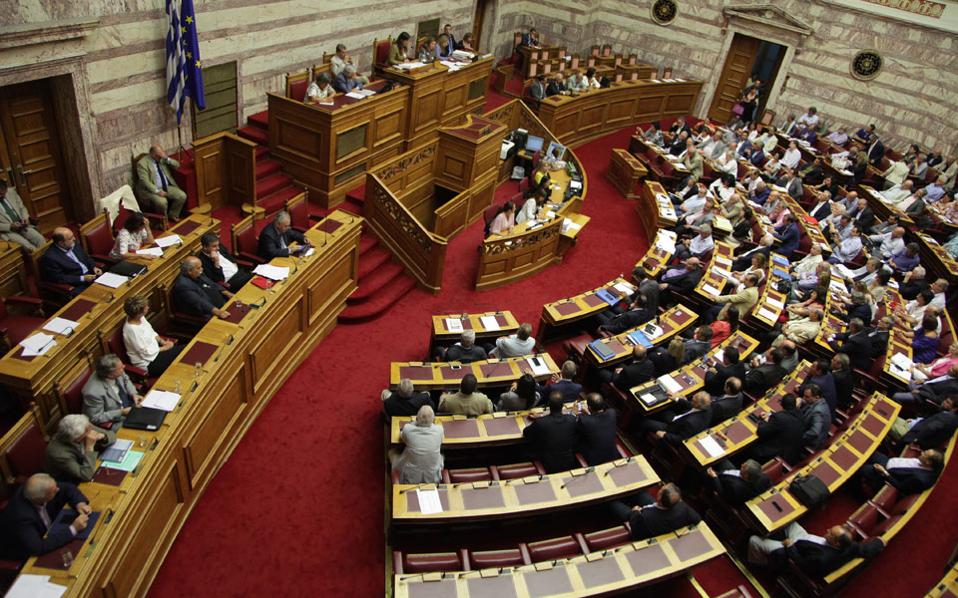Tsipras accuses opposition of delaying elections as coalition talks lead nowhere

Greek opposition leaders made zero progress on Sunday as they pressed on with trying to form a new coalition, despite appeals from home and abroad for a rapid move to elections so the country can deal with its simultaneous economic and humanitarian crises.
Conservative leader Evangelos Meimarakis spent the third and final day offered to him by Greece's president to form a government in vain, rebuffed by leftist outgoing Prime Minister Alexis Tsipras and the leaders of smaller parties in parliament.
The leisurely pace of coalition negotiations since Tsipras resigned on Thursday – after only seven months in office – has prompted media calls for a caretaker leader to implement further austerity and reform policies that are essential to ensure Greece keeps getting vital funds under its new bailout deal.
Tsipras denounced the tactics of Meimarakis and radical leftist Panagiotis Lafazanis – the man who led a walkout from Tsipras's SYRIZA party over the 86 billion euro ($98 billion) programme and is next in line to try to form a government.
"Don't bother with tricks aimed at delaying the elections. These won't get anywhere and the people understand this," Tsipras told senior government and SYRIZA members on Saturday.
He remains favourite to form the next government after elections, but whoever leads Greece next faces daunting problems. The country narrowly avoided financial collapse and possible exit from the euro when Tsipras caved in to euro zone and IMF demands to secure the bailout.
Lafazanis, whose Popular Unity party immediately became the third biggest when it split from SYRIZA on Friday, is due to receive his presidential mandate to try to put together a coalition on Monday following Meimarakis's failed attempts.
Lafazanis, whom Tsipras sacked as energy minister last month for rebelling, insists he will use his full three days but has ruled out dealing with anybody who supported the bailout.
That reduces his possible partners to the communists and Golden Dawn, an ultra-right group shunned by all the other parties. This unlikely combination would muster just 57 votes in the 300-seat parliament, under the current party standings.
While the creditors' money has started flowing to Greece, it could stop if they feel Athens is not sticking to its promises at a review in October. That would sink plans to rescue Greek banks brought to their knees by the crisis.
Adding to the urgency for a stable government, Greece is struggling with thousands of migrants, many of them refugees from the Syrian civil war.
They are landing on Greek islands in small boats, making their way to the mainland and heading to the Macedonian border where thousands are stuck in chaotic and squalid conditions, hoping to head for more prosperous countries in northern Europe.
Labyrinthine constitution
Under Greece's labyrinthine constitution, the three biggest parties are offered three days each to try to form a new coalition should a government resign after less than a year.
Only when these efforts have failed – something that is already a near certainty – can President Prokopis Pavlopoulos appoint a caretaker prime minister and call elections.
Some believe Greece cannot wait for action until after elections, which Tsipras wants held before the end of September.
"The country needs an experienced caretaker prime minister," Kathimerini newspaper said. "Implementing the accord reached with the lenders, recapitalising the banks and the migrant crisis are burning issues that cannot wait, not even one month."
Even Jeroen Dijsselbloem, the chairman of euro zone finance ministers so often at odds with Athens during the bailout negotiations, has taken common cause with Tsipras over elections. "I hope that they are as quick as possible so that the least possible amount of time is wasted," he told reporters.
Tsipras has turned down the opportunity to try to form a coalition after almost a third of his lawmakers rebelled in parliament over the bailout, depriving him of his majority and forcing him to rely on temporary support from the opposition.
According to a government official, he rejected a request for a meeting on Sunday from Meimarakis, who is interim leader of the New Democracy party, saying he had no chance of pulling a coalition together with the present parliamentary arithmetic.
SYRIZA's strategy is to use Tsipras's popularity to try to govern alone after elections. "Our goal is an absolute majority, an attainable goal, so that the next government can be stable and turbulence that the country does not need can be avoided," government spokeswoman Olga Gerovasili told Real radio.
The opposition appears to be dragging out the process as voters return from the summer holidays to find their living standards cut yet further by value-addd tax increases and the imposition of a "solidarity" income tax under the bailout.
These, along with more pension cuts for the elderly, may start to wear down the popularity of Tsipras, who at the moment seems to have no serious rivals.
[Reuters]





